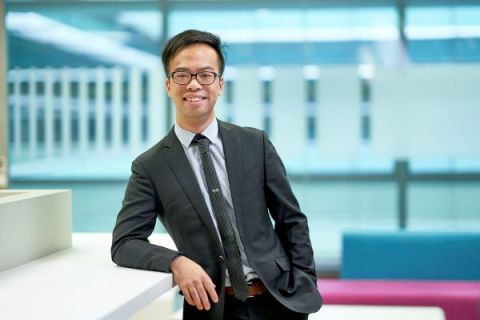
By Jovina Ang
SMU Office of Research – Despite being one of the top 10 richest nations in the world with a Gross Domestic Product (GDP) per capita of US$88,000, one in 10 Singaporeans still struggle to get enough, safe and nutritious food or face food insecurity at least once every 12 months.
Food-insecure households are more likely to reside in one- and two-room HDB (Housing Development Board) homes compared to food-secure households.
Household food insecurity comes about when a household does not have or is not confident of having ‘economic and physical access to sufficient, acceptable food for a healthy life’.
“Since joining Lien Centre for Social Innovation (LCSI) in 2018, I have had many opportunities to conduct research on social issues,” Senior Programme Manager (Research) Dr Dalvin Sidhu told the Office of Research. Dr. Sidhu is one of the recipients of the SMU Research Staff Excellence Awards 2023.
“Working at the LCSI has given me lots of exposure to a wide range of social issues, spanning from talent retention in the social service sector to philanthropy and, most recently, food insecurity,” she continued.
She added: “No one day is the same at the LCSI. The dynamic and ever-evolving nature of work at the centre has kept me engaged and passionate about my work. I am constantly challenged and inspired to learn, grow and stretch myself.”
“And I get to work on translative research, which is a type of research that bridges the gap between theory and practice to create real-world impact. Translative research is crucial as it ensures that findings are not only academically significant but also, practically applicable for driving meaningful change in society. I have been able to leverage the research skills I’ve honed during my PhD journey to contribute meaningfully to this wide range of research areas. To ensure that the research gets to policy makers, government leaders and community leaders, we publish reports that are easy to read and with infographics,” she elaborated.
Food insecurity
First Nationwide Study
Dr. Sidhu went on: “Being involved in the first nationwide study on food insecurity has opened my eyes about this important social issue. This study was commissioned by the Food Bank Singapore. And its objectives were to ascertain the prevalence, causes and consequences of food insecurity.”
The study, titled ‘The Hunger Report: An In-Depth Look at Food Insecurity in Singapore’, was led by Dr. Tania Nagpaul, who is currently Senior Lecturer at the Singapore University of Social Sciences, Dr. Sidhu and Dr Jinwen Chen, who works at the Northern Beaches Council in Australia.
About 1,200 households participated in the study that took place between July and December 2019.
The study revealed that low income and financial constraints were the major reasons why food insecurity exists.
The other reasons found were related to people’s inability to cook, time constraints, restricted mobility, incarceration, spouse bereavement and family breakdown, and dietary restrictions.
This suggests that food insecurity is a systemic issue that could happen to anyone.
The study also showed that even food insecurity did not drive the affected households to seek support as only 22 percent of them would do so.
More than half – 62 percent – of the food-insecure households did not seek food support because they were either embarrassed, unaware of available food support or believed that other people needed it more than themselves.
The study also found that food insecurity affects both physical health and mental health.
Second Food Insecurity Study
A follow-up study on food insecurity was conducted during the COVID-19 pandemic in 2021.
This study focused on the impact of interventions that could solve food insecurity. The two interventions included:
- Administering a ‘Needs Toolkit’ to understand the unique food needs and preferences of each household; and
- Addressing the specific needs of affected households by providing their desired food support for two months.
Following the implementation of the inventions, the results showed an improvement of 44 percent for the affected food-insecure households in the first study.
Additionally, the study found that 20 percent of the households no longer faced the issue.
The improvement to the food insecurity situation could be due to:
- More Singaporean seeking aid; and
- An increase in food support initiatives during the COVID-19 pandemic.
That said, 46 percent of the food-insecure households experienced no change and 10 percent experienced a worsening situation.
This study showed that food-insecure households wanted choices in how they received support, for example, supermarket vouchers instead of cooked food.
An analysis of receipts showed that 18.6 percent of groceries expenditure was on non-food items such as toiletries and cleaning materials.
Providing food support choices also had a direct impact on their psychological well-being.
Recommendations to address food insecurity
As a means to end food insecurity, Dr. Sidhu suggests the following:
Implement a food support model with choices.
Food-insecure households have specific needs – which is why providing choices matters to them. Choices could include supermarket vouchers, a stored-value card system where the affected households could have options where they would like to buy food or non-food items.
Develop a food support ecosystem.
Given that there is a need for providing non-food items such as toiletries and cleaning materials, developing a partner ecosystem among charities, and private and public organisations would enable the different organisations to share their resources to support their common cause.
Next steps
Dr. Sidhu was pleased to inform the Office of Research that the LCSI has been awarded a US$500,000 grant by the Citi Foundation in its first-ever Global Innovation Challenge to address food insecurity across lower-income households in Singapore.
She said: “We are the only grant recipient from Singapore among the 50 global community organisations that the Citi Foundation has named in its US$25 million worldwide initiative to strengthen food security and the financial health of low-income families and communities. With this grant, we will be able to propose a pilot that addresses the root cause of food insecurity.”
“We are currently working with social enterprises, as well as government agencies to gather their input as solving this problem calls for a multi-sector effort to create impactful solutions for food insecurity.”
For information about the research conducted by Lien Centre for Social Innovation, visit this link.
Back to Research@SMU August 2024 Issue
See More News
Want to see more of SMU Research?
Sign up for Research@SMU e-newslettter to know more about our research and research-related events!
If you would like to remove yourself from all our mailing list, please visit https://eservices.smu.edu.sg/internet/DNC/Default.aspx

